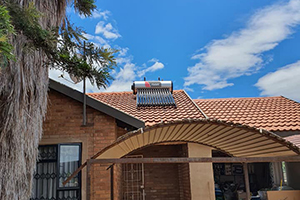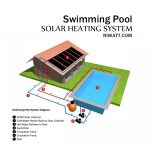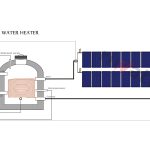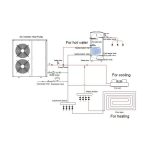What is the Advantages & Disadvantages of Solar Water Heaters
Alot of energy is used in the home to heat water. In fact, about 18 percent of home energy use goes towards heating water, according to the U.S. Department of Energy.
It is possible to reduce energy use and the associated costs, by switching to a home solar water heating system.
Such a system does not depend on fossil fuels and takes energy from the sun to heat stored water. It, therefore, saves money, which is a major advantage of solar heating systems. Energy from the sun doesn’t cost anything, so no charge from electrical utilities is needed.
Advantages of Solar Water Heaters
The advantages go beyond cost savings and the availability of power, which are also realized with solar electric systems. Here are a few unique perks of home solar water heating products that may convince you to upgrade your home.
Types:
-Active systems: These come in two forms. Direct circulation systems pump household water through collectors, which is then delivered to where needed in the house. They have automatic controllers that sense when sunlight is available. However, the systems are ineffective in temperatures below freezing.
-Indirect circulation systems heat water by pumping it through a heat-transfer fluid that doesn’t freeze. It’s then sent through collectors and a heat exchanger. Operational in freezing temperature and in multiple heating applications, they’re often more expensive than direct circulation systems.
-Passive systems: Two types are available here as well. An integral collector-storage passive system consists of a storage tank, solar collection unit, and pipes that pump cold water into the collector. It suits a home that needs hot water in the day and evening but also doesn’t work as well in cold outside temperatures.
-A thermosyphon system works on the principle of warm water rising and cold water sinking. Warm water in the collector rises into the storage tank, which is a reliable configuration. A downside is the weight of the storage tank, which can be a challenge for contractors working on the roof; the system is a more expensive option as well.
Other advantages include:
Choice of size: Proper sizing is essential, as homeowners must have enough storage to meet 90 to 100 percent of their hot water needs. Storage volume is also a consideration. A 50- to 60-gallon storage tank is fine for up to three people, an 80-gallon tank for up to four people, and a larger one for as many as six people.
Less space: Solar thermal panels are usually less space-intensive than photovoltaic panels. Fewer are required to heat water than in an array used to produce sufficient power for a home.
High efficiency: About 80 percent of the sun’s radiation is turned into the heat energy needed to obtain hot water at home.
Cost savings: The cost of two or three panels is cheaper than larger domestic installations. You also save on fuel bills for supplying gas heating systems.
Low maintenance: After installation, little maintenance is required, and a solar water heater can run for up to 20 years.
Lower carbon footprint: A home can be eco-friendlier, plus tax incentives may be available for using renewable energy.
Disadvantages of Solar Water Heaters
Maintenance is one disadvantage, although most systems don’t require a high degree of care. However, scaling occurs when there are minerals suspended in domestic water, which build up as calcium deposits in the system. Adding water softeners or mild acidic substances such as vinegar can avoid scaling. It only must be done every three to five years, but this can vary depending on the water quality.
Corrosion is another concern. In open loop hydronic solar systems, oxygen can rust any iron or steel part. The plumbing components are more resistant if they’re made of copper, brass, bronze, stainless steel, plastic or rubber. Storage tanks should be lined with glass or plastic to resist corrosion as well.
Also, active systems can overheat if the size of the storage tank isn’t appropriate for the collector. The general rule is that for each square foot of collector, there should be 1.5 gallons of storage. With that in mind, such a disadvantage can be avoided.
Other disadvantages:
Compared to photovoltaic panels, solar thermal panels only heat water.
Solar heaters require sufficient roof space to accommodate them.
Solar water heaters require direct sunlight to function.
The system does not function on cloudy, rainy, or foggy days.
Annual maintenance is recommended to check the pump and antifreeze.
Installation requires the use of a new hot water cylinder.
Also, heating is only provided in the daytime. That does not mean hot water won’t be available at night. An insulated storage tank can maintain water temperature so that the water heated during the day can be used during nighttime hours.
Cost can be another disadvantage. Oftentimes a solar water heating system costs more in terms of purchasing and installation, compared to other types of water heaters. The savings come over the long run because water heating bills can be reduced by as much as 50 to 80 percent. Price hikes, fuel shortages, and other issues with utility-based heat are not a concern either.
CONCLUSIONS:
Solar water heaters have their advantages and disadvantages, but they are reliable and efficient. Planning and proper installation help homeowners get the most out of them and avoid some of the disadvantages while reaping all the benefits the right system and size can afford.
Join the clean energy revolution! Learn more about wind and solar power from Arcadia.



